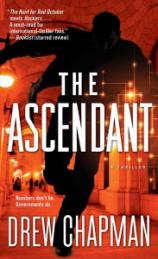The Ascendant
Review
The Ascendant
When we think of wars, what typically comes to mind are explosions, boots on the ground, and violent death. That definition still pertains, though it is slowly changing. War is also being waged in cyberspace, in rooms on opposite sides of the planet where people sit in front of computer monitors and probe security weaknesses in the information systems that drive and operate nations’ financial institutions, military operations and research facilities. It is this modern and futuristic war front, which often blurs with the more traditional methods of conflicts, that forms the basis for THE ASCENDANT, the first of what hopefully will be a long-running series by debut novelist Drew Chapman.
The driving force behind the book is Garrett Reilly, a twenty-something gifted oddball who is one of the brightest and fastest rising stars on Wall Street. Hated and envied by many, and loved by a dwindling few, Reilly is a bond-trading whiz kid at the white-shoe Wall Street firm of Jenkins & Altshuler. The not-so-secret ingredient to his success is his ability to see patterns in numbers. We’re not talking evens and odds or even recurrent primes; we’re talking deep patterns in long strings of digits, the types of strings that cause the eyes of most folks to glaze over. Think ISBNs or the serial numbers on dollar bills, multiply by four and then cube --- those kinds of numbers.
"[Chapman's] cinematic background...serves him well here, as demonstrated by the pace and flow of the narrative, which seems to effortlessly transport readers from beginning to end, leaving one looking forward to the promised sequel."
Reilly’s ability is both a blessing and a curse, given that it’s not something that he can turn on when he hits the office door at the beginning of the work day and turn off when he leaves. Turning it off requires the use of controlled substances, a practice that he engages in on a regular basis outside of work. Throw in a basically amoral worldview, a superior attitude and a boatload of anger toward just about everyone except a very select few, and you have a pretty good idea of what Garrett Reilly is all about.
Reilly’s life is forever changed when he notices that a king’s fortune in U.S. treasury bonds is being surreptitiously sold off by the Chinese. He goes to his mentor at the firm, and the U.S. government soon becomes aware of the action. The decision is made by the higher-ups in the U.S. military to recruit Reilly for a top-secret project. The problem, though, is that Reilly is not exactly patriotic in general and positively loathes the military. However, when he is the target of an attack in the middle of the financial district, he takes the path of least resistance and lets the military spirit him away to a secret and ostensibly safe location.
Reilly becomes a somewhat reluctant recruit in the new war, which provides him and the author with a chance to engage in a bit of global hopscotching --- from the seats of power in Washington D.C., to the faux glamour and glitz of Las Vegas, to the rural and dangerous countryside of China. There’s also a strong element of fish-out-of-water paranoia, given that Reilly encounters a number of characters whose trustworthiness is called into question, not the least of whom is the extremely competent and fetching Alexis Truffant, who is instrumental in recruiting him to begin with. Chapman puts Reilly and the reader through some twists and turns before bringing the story to an end, which is complete in itself but leaves things open for much, much more.
One gets the sense that Chapman may have given birth to a new subgenre of the thriller with this book and character. His cinematic background --- he has created and written a number of shows for network television --- serves him well here, as demonstrated by the pace and flow of the narrative, which seems to effortlessly transport readers from beginning to end, leaving one looking forward to the promised sequel. One can’t read THE ASCENDANT without thinking and wondering what lurks in the dark web and the effect it may be having on our everyday lives.
Reviewed by Joe Hartlaub on January 8, 2014





